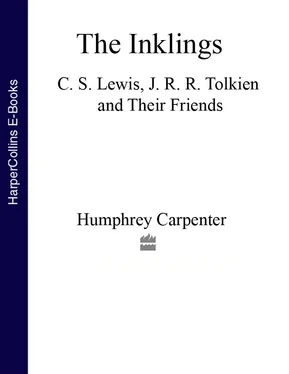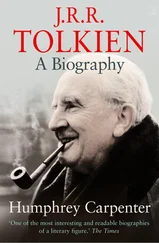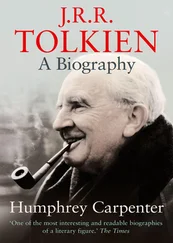1 ...8 9 10 12 13 14 ...22 The friendship was not quite so important to Lewis as it was to Tolkien. Late in 1931 Lewis, writing to Arthur Greeves, described Tolkien as ‘one of my friends of the second class’. In the first class, as he explained in the same letter, were Greeves himself and Owen Barfield.
To anyone studying Lewis’s life, Arthur Greeves is constantly present in the background: a shadowy figure who actually played no part in the action but was the constant recipient of confidences and reflections from Lewis. There is in fact little to be said about him. His family were neighbours of the Lewises in Belfast. Arthur himself was slightly older than Jack Lewis but distinctly less mature: rather childlike, in fact, brought up in perpetual anxiety about his health and, because of his poor constitution and plentiful family funds, soon abandoning any attempt to earn his living. He was so different from Lewis that the friendship seems rather surprising, yet they corresponded regularly, Lewis using Greeves as a mixture of father-confessor and spiritual pupil. With Arthur Greeves he discussed, in adolescent days, questions relating to sex – Greeves later scored out these passages in the letters – and to Greeves he was also something like frank on the topic of Mrs Moore. In fact Greeves burnt several pages which may have contained a full account of Lewis’s relationship with her. On the other hand he often lectured Greeves on weak spelling or poor morale, taking a condescending line with his friend. It was altogether an odd and distinctly schoolboyish correspondence.
Lewis’s friendship with Owen Barfield was of a very different nature, for he regarded Barfield as in every way an intellectual equal and in some respects superior to himself. Of smaller and lighter build than Lewis, Barfield was lithe and nimble – he thought at one time of earning his living as a dancer – and though almost equally adept at logical argument he had none of Lewis’s rather heavy-handed dogmatism.
Lewis and Barfield often took holidays together, and from 1927 onwards they went on a walking tour with a couple of friends almost every spring.
*
It was an idyllic way to spend three or four days. Footpaths were plentiful, motor traffic rarely disturbed the quiet of the countryside, roads were often unmetalled and comfortable to the feet, inns were numerous and cheap, so that reservations for the night were not often necessary, and pots of tea and even full meals could be bought in most villages for the smallest sums. Much of rural England was in fact still as it had been in the nineteenth century.
In April 1927 Lewis and Barfield, together with two friends from undergraduate days, Cecil Harwood and W. O. Field (known as ‘Woff’ from his initials), walked along the Berkshire and Wiltshire downs, through Marlborough and Devizes, and then across the edge of Salisbury Plain to Warminster. A year later their walking tour was across the Cotswolds, and in 1929 they made a four day journey from Salisbury to Lyme Regis. But though the route was different every year their habits were almost unvarying. They did not attempt to cover vast distances each day, in the manner of fanatical hikers – Lewis said he disliked the word ‘hiking’ because it was unnecessarily self-conscious for something so simple as going for a walk – but they certainly set a good pace, and would reckon to do perhaps twenty miles a day, maybe a little more on easy country or rather less if the going was rough. Lewis refused to allow the party to take packed meals, insisting on plenty of stops at pubs. He and his friends always made a mid-morning halt for beer or draught cider, and there was more beer at lunch time as an accompaniment to bread and cheese. Lunch was always concluded by a pot of tea, and more tea was drunk at an inn or cottage in mid-afternoon. Indeed Lewis cared for his tea just as much as for his beer, if not more so. Meals were simple but usually excellent. On Salisbury Plain in 1929 they were ‘given tea by a postmistress, with boiled eggs and bread and jam ad lib., for which she wanted to take only sixpence’, and for supper that night at Warminster they had ‘ham and eggs, cider, bread, cheese, marmalade and tea’.
Sometimes things went wrong. Of the Cotswolds trip in 1928 Lewis reported to his brother: ‘This time we committed the folly of selecting a billeting area for the night instead of one good town: i.e. we said “Well here are four villages within a mile of one another and the map marks an inn in each so we shall be sure to get somewhere.” Your imagination can suggest what this results in by about eight o’clock of an evening, after twenty miles of walking, when one is just turning away from the first unsuccessful attempt and a thin cold rain is beginning to fall. Yet these hardships had their compensations: thin at the time, but very rich in memory. One never knows the snugness and beauty of an English village twilight so well as in the homelessness of such a moment: when the lights are beginning to show up in the cottage windows and one sees the natives clumping past to the pub – clouds meanwhile piling up “to weather” Our particular village was in a deep narrow valley with woods all round it and a rushing stream that grew louder as the night came on. Then comes the time when you have to strike a light (with difficulties) in order to read the maps: and when the match fizzles out, you realise for the first time how dark it really is: and as you go away, the village fixes itself in your mind – for enjoyment ten, twenty, or thirty years hence – as a place of impossible peace and dreaminess.’
Occasionally – very occasionally indeed – Lewis and his friends would abandon a walk because of bad weather. But nothing short of a continuous downpour would stop them. Lewis himself was particularly determined to carry on through all but impossible conditions, maintaining stoutly that every kind of weather has its attractions. On Exmoor in 1930 the companions woke up in the morning to find a thick fog. ‘Some of the others were inclined to swear at it,’ wrote Lewis, ‘but I (and I soon converted Barfield) rejoiced to meet the moor at its grimmest. In the afternoon the fog thickened but we continued in spite of it to ascend Dunkery Beacon as we had originally intended. There was of course not a particle of view to be seen.’
He was similarly determined to enjoy every kind of landscape, however dull it might seem to other people. His brother Warnie recorded of a journey they made near Plymouth in 1933: ‘We had a long, tiresome, and very hot walk of about ten miles in hot sunken lanes, from which one occasionally got a glimpse of a dull, commonplace countryside, peppered with bungalows. J. and I argued briskly about the country we had walked through, J. contending that not to like any sort of country argues a fault in oneself: which seems to me absurd. He also said that my description of what we had seen – “lacking in distinction” – was “almost blasphemous”. But I suspect that he was talking for victory.’
There was a certain amount of this ‘talking for victory’ on the walking holidays, for Lewis liked to argue with his companions as they walked. They were all of them well matched. Lewis, writing to ‘Woff’ Field, defined their characteristics as ‘Owen’s dark, labyrinthine pertinacious arguments, my bow-wow dogmatism, Cecil’s unmoved tranquillity, your needle-like or greyhound keenness’. But too much serious talk was discouraged. One year when Lewis’s pupil Griffiths (later Dom Bede Griffiths) joined them, he offended protocol by engaging Barfield in a lengthy and profoundly serious theological battle. Equilibrium was badly upset, nor was it restored until the party had him cracking jokes along with the rest of them. The kind of day they really liked was one such as in Dorset when they ‘got through the serious arguments in the ten miles before lunch and came down to mere fooling and school-boy jokes as the shadows lengthened.’
Читать дальше












